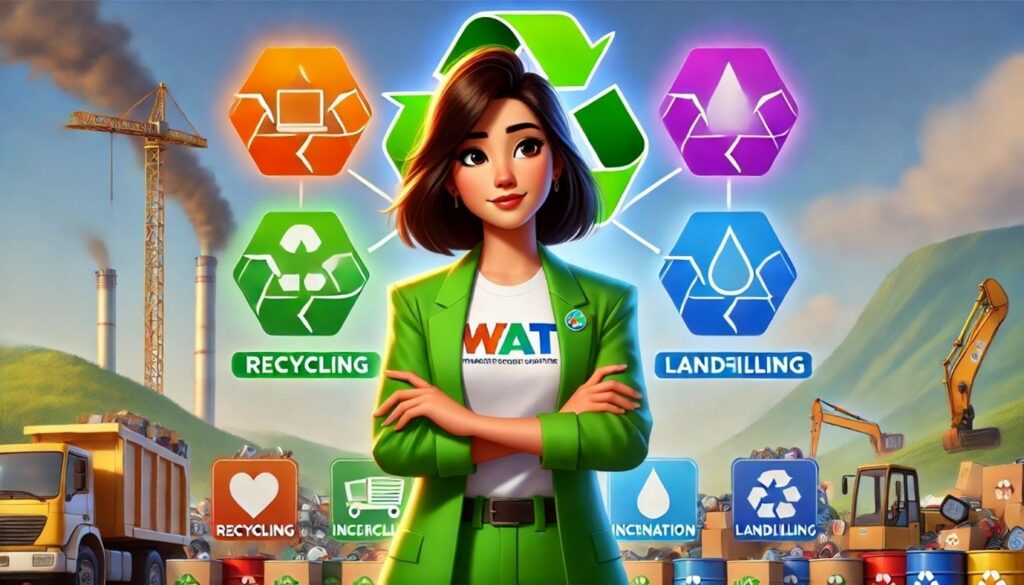E-waste management is a complex challenge with multiple potential pathways. Each option carries its own set of environmental impacts, risks, and benefits. In this article, we will explore the various e-waste management methods, analyzing their effects on the environment and highlighting the importance of protecting data security in the process. And, we will present WAT’s approach as the gold standard for responsible e-waste management.
Option 1: Landfilling
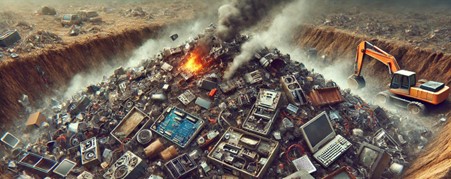
Landfilling is one of the most common methods of disposing of e-waste, particularly in regions with limited recycling infrastructure. However, this approach has significant downsides:
- Soil Contamination: As electronic devices decompose, hazardous materials such as lead, mercury, and cadmium leach into the soil, contaminating it and potentially reaching agricultural land.
- Groundwater Pollution: Toxic chemicals from e-waste can seep into groundwater systems, posing a risk to drinking water supplies and aquatic ecosystems.
- Long-term Environmental Damage: Landfills are not a sustainable solution, as they contribute to long-term environmental degradation and waste accumulation without recovering valuable materials.
Landfilling e-waste is a last-resort option that should be minimized as much as possible due to its significant negative impacts on the environment and human health.
Option 2: Incineration
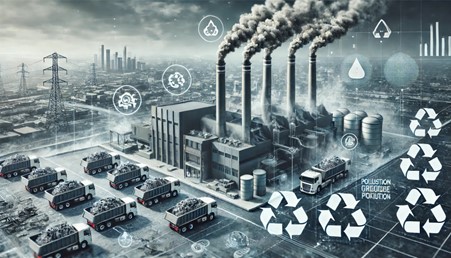
Incineration involves burning e-waste at high temperatures to reduce its volume and recover energy. While this method can help manage large quantities of waste, it also has serious drawbacks:
- Air Pollution: Incinerating e-waste releases toxic substances, including dioxins, furans, and heavy metals, into the atmosphere, contributing to air pollution and health hazards.
- Greenhouse Gas Emissions: The process generates significant amounts of CO2, exacerbating climate change.
- Loss of Recoverable Materials: Incineration destroys valuable materials that could otherwise be recycled and reused, leading to resource wastage.
Given these environmental concerns, incineration should be limited to cases where recycling or other forms of waste management are not feasible.
Option 3: Informal Recycling
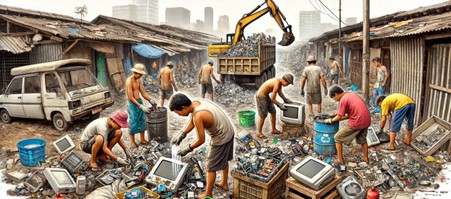
Informal recycling refers to the unregulated and often hazardous methods of processing e-waste, primarily in developing countries. This approach is prevalent due to the economic opportunities it offers to impoverished communities, but it comes with severe consequences:
- Health Risks: Workers in informal recycling operations are frequently exposed to toxic chemicals without adequate protection, leading to serious health issues such as respiratory problems, neurological damage, and cancers.
- Environmental Degradation: Informal recycling methods, such as open burning and acid baths, release harmful substances into the environment, polluting air, water, and soil.
- Economic Inefficiency: These practices are often inefficient, resulting in the loss of valuable materials that could be recovered through formal recycling processes.
Informal recycling represents a major challenge in global e-waste management, highlighting the need for stronger regulations and support for safe, sustainable recycling practices.
Option 4: Formal Recycling

Formal recycling is the preferred method of managing e-waste, involving regulated processes that prioritize safety, efficiency, and environmental protection. The benefits of formal recycling include:
- Material Recovery: Precious metals, plastics, and other valuable components are efficiently recovered and repurposed, reducing the need for new raw material extraction.
- Environmental Protection: Formal recycling facilities are equipped with advanced technologies that minimize emissions and prevent the release of harmful substances into the environment.
- Health and Safety: Workers in formal recycling operations are provided with proper safety equipment and training, reducing the risks associated with handling hazardous materials.
- Economic and Social Benefits: Formal recycling supports job creation, economic growth, and improved public health outcomes through sustainable practices.
Formal recycling stands as the most environmentally responsible and economically viable option for managing e-waste, particularly when coupled with strong regulatory frameworks and industry standards.
WAT's Approach: The Gold Standard in E-Waste Management
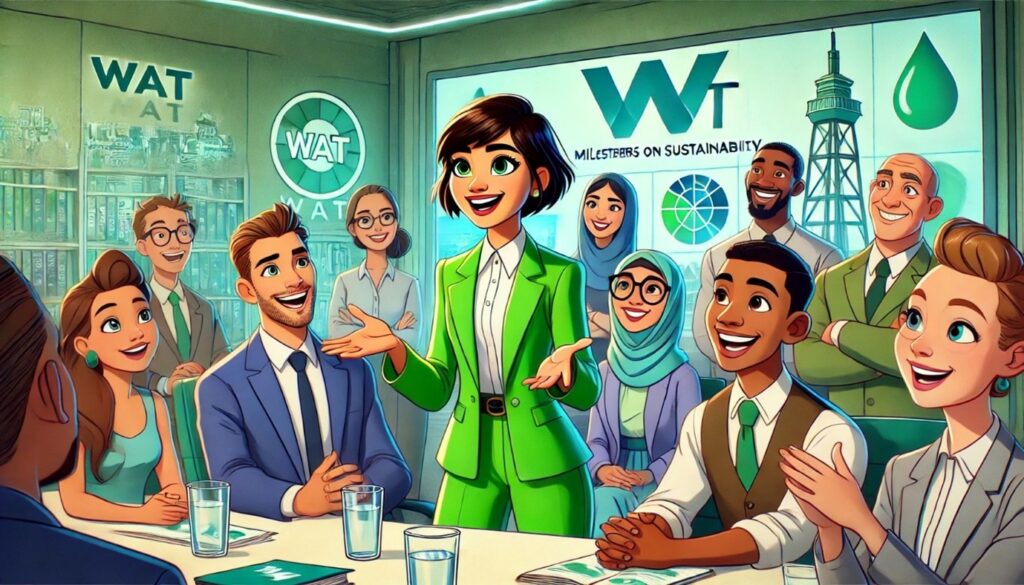
At WAT, we are committed to setting the benchmark for responsible e-waste management. Our approach not only integrates the best practices from formal recycling but also emphasizes data security, environmental stewardship, and the convenience of our services. We work closely with a diverse range of partners, making WAT the most convenient choice for managing e-waste.
Our comprehensive solutions begin with offering options to repair or upgrade your existing IT products. By adapting to your specific needs, we help you maximize the use of your equipment, reducing e-waste from the outset. We provide detailed reporting on all activities, ensuring transparency and accountability throughout the process.
Driven by our commitment to technology for technology, we have developed a platform designed to make e-waste management simple, easy, and compliant with the regulations of your location. Our approach is localized, reducing the carbon footprint by managing e-waste as close to its source as possible.
- Comprehensive Recycling Process: We ensure that all materials are either recycled or repurposed in an environmentally manner, minimizing waste and maximizing resource recovery.
- Data Security: We prioritize the secure handling of electronic devices, ensuring that all sensitive data is completely wiped or destroyed before recycling, protecting our clients’ privacy and preventing data breaches.
- Sustainability Commitment: WAT is dedicated to reducing the environmental impact of e-waste through continuous innovation and adherence to the highest industry standards.
- Education and Advocacy: We actively engage with communities and industries to raise awareness about the importance of responsible e-waste management and to promote best practices globally.
WAT’s comprehensive approach not only protects the environment but also sets a new standard for how e-waste should be managed. By leveraging our extensive network of partners, offering adaptable solutions, and utilizing cutting-edge technology, we ensure that all aspects of sustainability, security, and convenience are addressed.
Choosing the right path for e-waste management is crucial for protecting our planet and our future. By embracing best practices, prioritizing data security, and adapting to the specific needs of our partners, WAT is leading the way in e-waste management. Together, we can create a cleaner, safer world through thoughtful and informed e-waste management practices.
